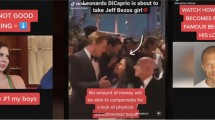Abstract
Three elements of discourse about Holocaust denial after a Holocaust denial advertisement appeared in a campus newspaper are studied using a survey of a convenience sample of students and in-depth qualitative interviews. First, the level of acceptance of the Holocaust denial message was found to be minimal, despite findings that knowledge about the Holocaust among students is also low. Second, many students believed that a Holocaust denier had the right to free speech and to advertise in the campus newspaper. The bases for these statements and their relation to civil liberties discourse were found to be somewhat confused Since approaches to Holocaust denial that might be interpreted by students as censorship are therefore likely to backfire, strategies and rationales students themselves employ to reject denial are explored third. Students had strong emotional motivations to dismiss Holocaust denial, rooted in both their unwillingness to feel betrayed and in an array of unexpectedly positive associations and identities that the Holocaust evokes.
Similar content being viewed by others
References
Akerstrom, Malin. 1991.Betrayal and Betrayers: The Sociology of Treachery. New Brunswick, NJ: Transaction.
Alexander, Edward. 1995.The Holocaust and the War of Ideas. New Brunswick, NJ: Transaction.
Batson, C. Daniel. 1991.The Altruism Question. Hillsdale, NJ: Lawrence Erlbaum.
Benavie, Barbara. 1982. “The Holocaust: Something for Everybody.”Jewish Digest 27(5): 3–6.
Bischoping, Katherine. 1995.Papers in Holocaust and Genocide Studies. University of Michigan: Unpublished doctoral dissertation.
—. 1996. “Interpreting Social Influences on Holocaust Knowledge,”Contemporary Jewry 17: 106–137.
Bishop, Katherine. 1991. “Hoping to Change Minds of Young on Holocaust.”New York Times Dec.22.
Bobo, Lawrence and Frederick C. Licari. 1989. “Education and Political Tolerance: Testing the Effects of Political Sophistication and Target Group Affect.”Public Opinion Quarterly 53: 285–308.
Cohen, Carl. 1978. “Right to be Offensive: Skokie—the Extreme Test.”Nation Apr.15, 226: 422–428.
Denitch, Bogdan. 1994.Ethnic Nationalism. Minneapolis: University of Minnesota Press.
Downs, Donald A. 1985.Nazis in Skokie: Freedom, Community and the First Amendment. New York: Harper & Row.
Friedlander, Albert H. 1984. “Misuses of the Holocaust.”Jewish Digest 29(6): 7–16.
Garfinkel, Harold. 1967.Studies in Ethnomethodology. Cambridge, UK: Polity Press.
Golub, Jennifer and Renae Cohen. 1993. “What Do Americans Know about the Holocaust?” New York: American Jewish Committee, Working Papers on Contemporary Anti-Semitism.
Gutman, Roy. 1993.A Witness to Genocide. New York: Macmillan.
Gutman, Yisrael. 1985.Denying the Holocaust. Jerusalem: Institute of Contemporary Jewry, Hebrew University of Jerusalem.
Hovannisian, Richard. 1986. “The Armenian Genocide and Patterns of Denial” Pp. 111–133 inThe Armenian Genocide in Perspective, edited by Richard Hovannisian. Oxford: Transaction.
Ignatieff, Michael. 1993.Blood and Belonging. New York: Viking.
Karylowski, Jerzy. 1982. “Two Types of Altruistic Behavior: Doing Good to Feel Good or to Make the Other Feel Good.” Pp. 398–413 inCooperation and Helping Behavior, edited by Valerian J. Derlega and Janusz Grzelak. New York: Academic.
Krosnick, Jon A. and Howard Schuman. 1988. “Attitude Intensity, Importance, and Certainty and Susceptibility to Response Effects.”Journal of Personality and Social Psychology 54: 940–952.
Lipstadt, Deborah. 1993.Denying the Holocaust: The Growing Assault on Truth and Memory. New York: Free Press.
MacKinnon, Catharine. 1993.Only Words. Cambridge, MA: Harvard University Press.
Marcus, George E., John L. Sullivan, Elizabeth Theiss-Morse, and Sandra L. Wood. 1995.With Malice toward Some: How People Make Civil Liberties Judgments. New York: Cambridge University Press.
Miller, Judith. 1990.One, by One, by One. New York: Simon & Schuster.
Moore, David W. and Frank Newport. 1994. “Misreading the Public: The Case of the Holocaust Poll.”The Public Perspective 5 (March–April): 28–29.
Moscovici, Serge. 1985. “Social Influence and Conformity.” Pp. 347–396 inThe Handbook of Social Psychology, vol 2, edited by G. Lindzey and E. Aronson. New York: Random House.
Petty, Richard E. and John T. Cacioppo. 1986.Communication and Persuasion. New York: Springer Verlag.
Piliavin, Jane A., John F. Dovidio, Samuel L. Gaertner, and Russell D. Clark. 1981.Emergency Intervention. New York: Academic.
Roiphe, Anne. 1988.A Season for Healing. New York: Summit.
Schatzker, Chaim. 1980. “The Teaching of the Holocaust: Dilemmas and Considerations.”Annals of the American Academy of Political and Social Sciences 450:218–226.
Stouffer, Samuel A. 1963Communism, Conformity, and Civil Liberties. Gloucester, MA: Peter Smith.
Vidal-Naquet, Pierre. 1992.Assassins of Memory. New York: Columbia University Press.
Werth, Lucy Fontaine and Jenny Flaherty. 1986. “A Phenomenological Approach to Human Deception.” Pp. 293–311 inDeception: Perspectives on Human and Nonhuman Deceit, edited by Robert W. Mitchell and Nicholas S. Thompson. Albany, NY: State University of New York Press.
Zielinski, Siegfried. 1990. “History as Entertainment and Provocation: The TV series ‘Holocaust’ in West Germany.”New German Critique 19: 81–96.
Author information
Authors and Affiliations
Additional information
I thank Norbert Schwarz for generously allowing me to use data from the student survey that we designed and conducted.
Rights and permissions
About this article
Cite this article
Bischoping, K. Responses to holocaust denial: A case study at the university of Michigan. Cont Jewry 18, 44–59 (1997). https://doi.org/10.1007/BF02965479
Issue Date:
DOI: https://doi.org/10.1007/BF02965479



